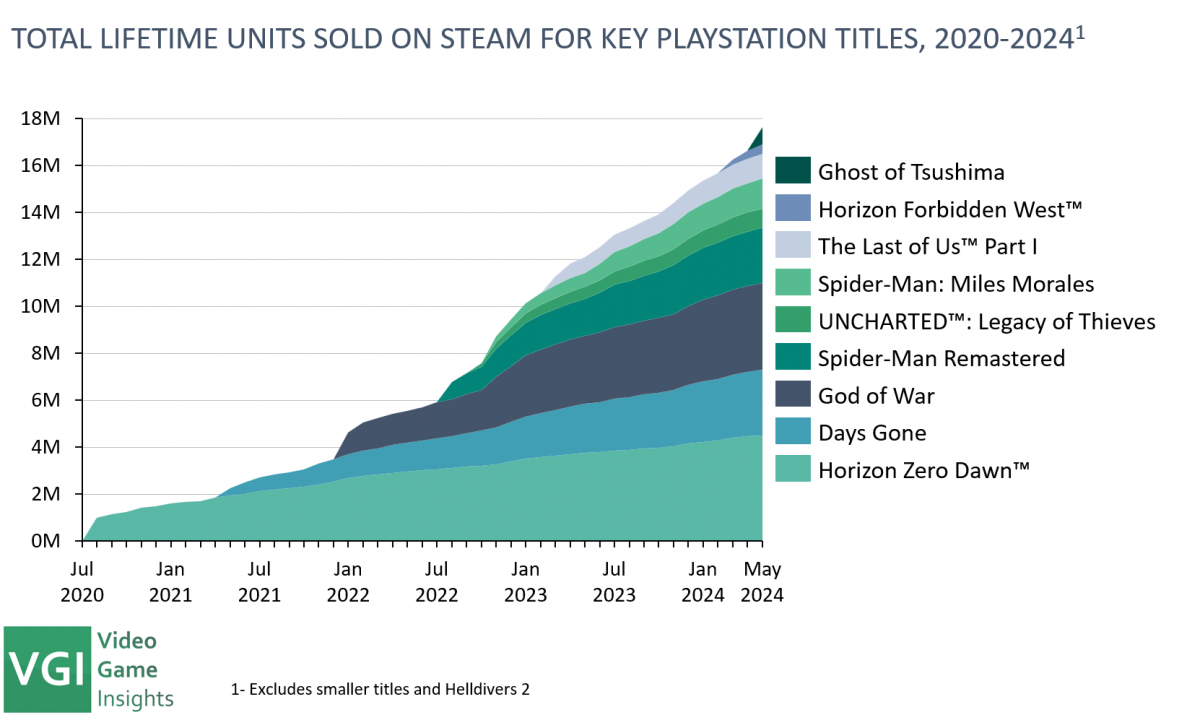For many years, PlayStation has relied on platform exclusives to encourage players to buy its hardware and remain within its ecosystem. This strategy, also commonly used by Xbox and Nintendo, has been highly effective. However, since 2020, there has been a significant shift in this approach. This article explores why publishers are moving towards cross-platform strategies and examines how this shift has impacted PlayStation to date.
PlayStation’s move away from exclusivity
Up until 2020, PlayStation had released only three games on Steam. Their first ever game, funnily enough, was Helldivers. These initial releases were relatively minor in the grand scheme of Sony’s portfolio.
However, in August 2020, Horizon Zero Dawn was launched on Steam, marking the beginning of a significant shift. Since then, 14 PlayStation exclusives have made their way to the Steam platform.
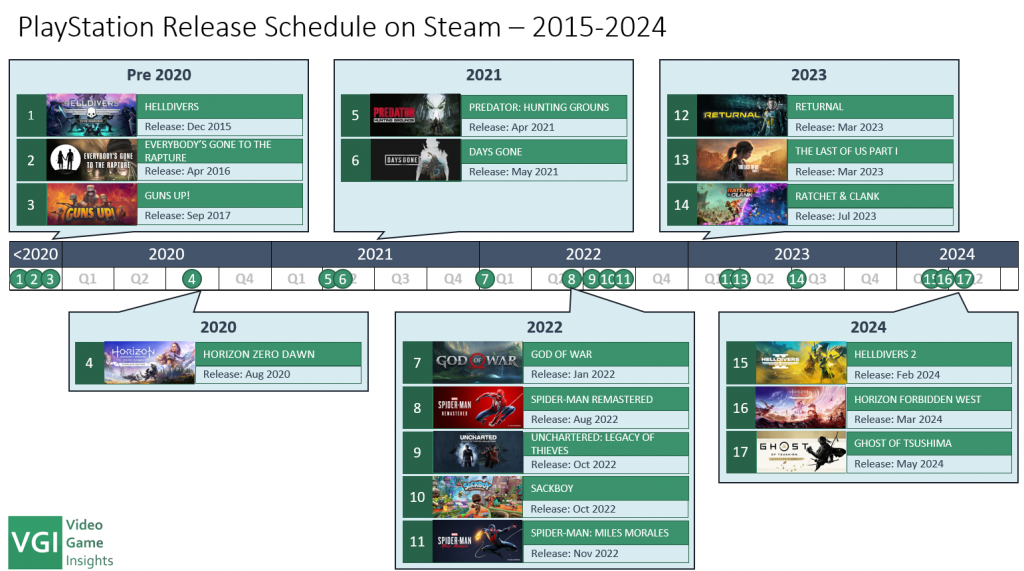
The release strategy for these games can be categorized into three distinct approaches:
- PC release approximately 3-4 years after PS release – This category includes major IPs like Horizon Zero Dawn, God of War, Spider-Man Remastered, and Ghost of Tsushima.
- PC release 2 years after PS release – Titles such as Days Gone, Sackboy, Spider-Man: Miles Morales, Returnal, Ratchet & Clank, and Horizon Forbidden West fall into this category. These games are typically one tier below the top sellers and benefit from a shorter exclusivity window as their sales curves tend to flatten out sooner.
- Day 1 PC & PS5 release – Live service games are released on both platforms simultaneously to maximize engagement rather than to entice PC gamers to switch to PlayStation.
In total, these PlayStation ports have sold over 17 million units on PC, excluding Helldivers 2. Including Helldivers 2, the total exceeds 28 million units (yes, Helldivers 2 is that crazy).
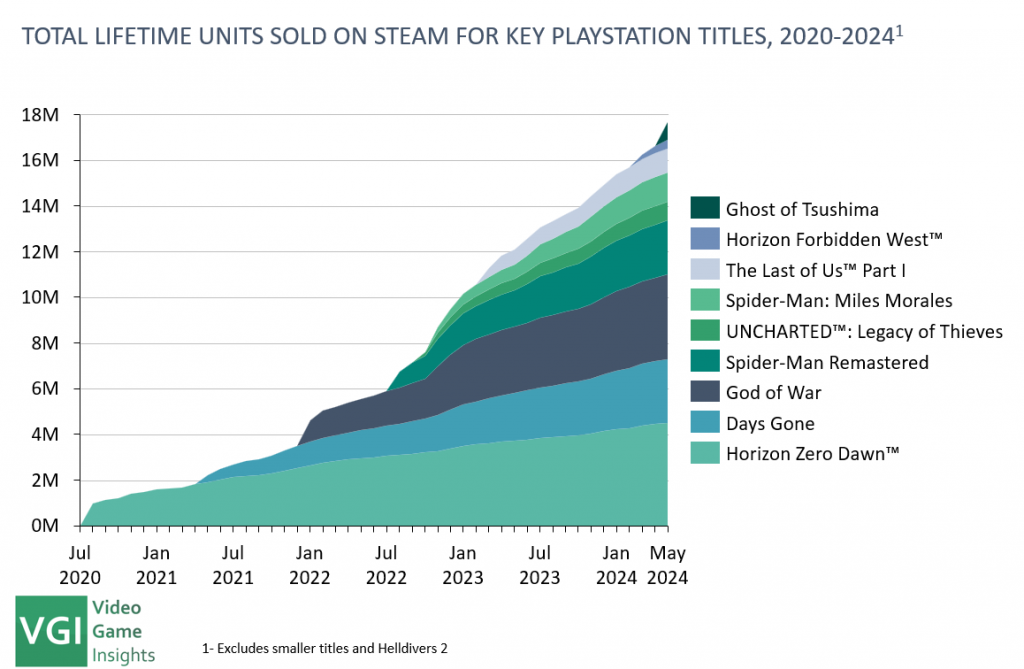
All unit sales estimates are derived from the Video Game Insights platform data. Although these figures are estimates, they align closely with PlayStation’s reported and leaked numbers, providing a fairly reliable approximation of actual sales.
PlayStation’s PC Porting Strategy: Three Key Aims
- Maximize Launch Sales on the PS Platform: By prioritizing initial releases on PlayStation, they save the 30% Steam platform fee. More importantly, it is an important retention mechanism. This approach encourages players to stay on the PlayStation platform to access exclusives upon launch. It’s a page out of the film and TV playbook, where HBO originals debut on HBO before becoming available on other channels and platforms later.
- Optimize PC sales – Therefore, PlayStation aims to launch on PC once the primary sales cycle on PlayStation’s platform concludes. Given that relatively low porting costs, sales on PC represent a high-margin opportunity.
- Expand audiences and direct them to PlayStation – Future PlayStation co-CEO Herman Hulst talked about the PC strategy recently, mentioning the aim to draw new players towards the PS5 as they play the original IPs on PC and want to get early access to sequels.
It’s a careful balancing act to get the porting timing just right, but there are clear advantages VS a full exclusivity approach.
How the Strategy is Paying Off: The Example of Ghost of Tsushima
Ghost of Tsushima is the most recent example of PlayStation’s strategy, launching on Steam in May 2024, nearly four years after its original release. Its Steam debut was one of the most successful ports to date, with over 800,000 units sold in the first 20 days, comparable to the launches of Spider-Man and Horizon Zero Dawn.
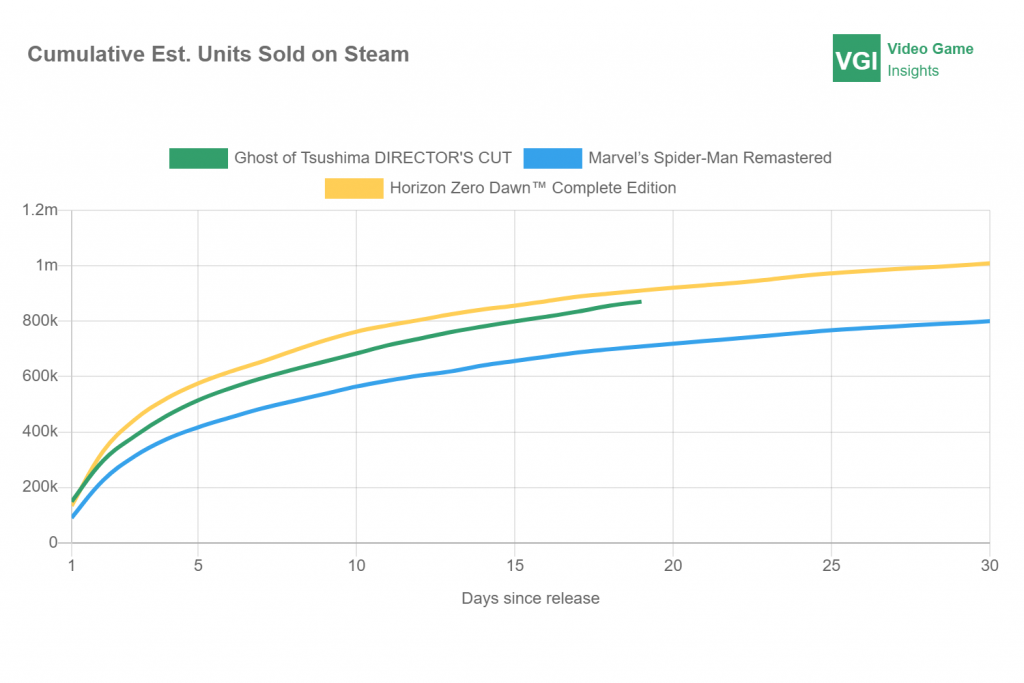
In terms of player retention, Ghost of Tsushima has performed even better. While it launched with similar concurrent player (CCU) numbers as Spider-Man and Horizon, it has maintained nearly double the CCU by day 20.
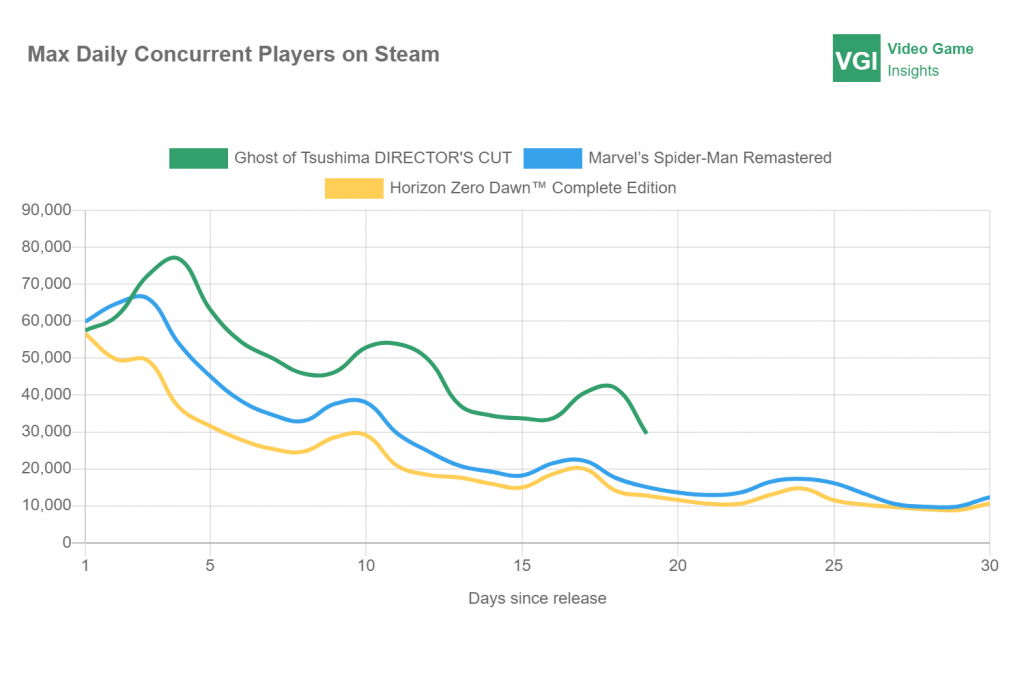
While Ghost of Tsushima is a great title and well received (90% positive ratings on Steam), it’s an objectively less known IP VS Spider-man and Horizon. Ghost of Tsushima sold well on PlayStation but didn’t get close to the other two. So, what made its launch so successful on Steam?
This success highlights the effectiveness of PlayStation’s Steam strategy. Ghost of Tsushima built up nearly 1.5 million wishlists within a couple of months before its launch, indicating growing trust and anticipation for PlayStation ports.
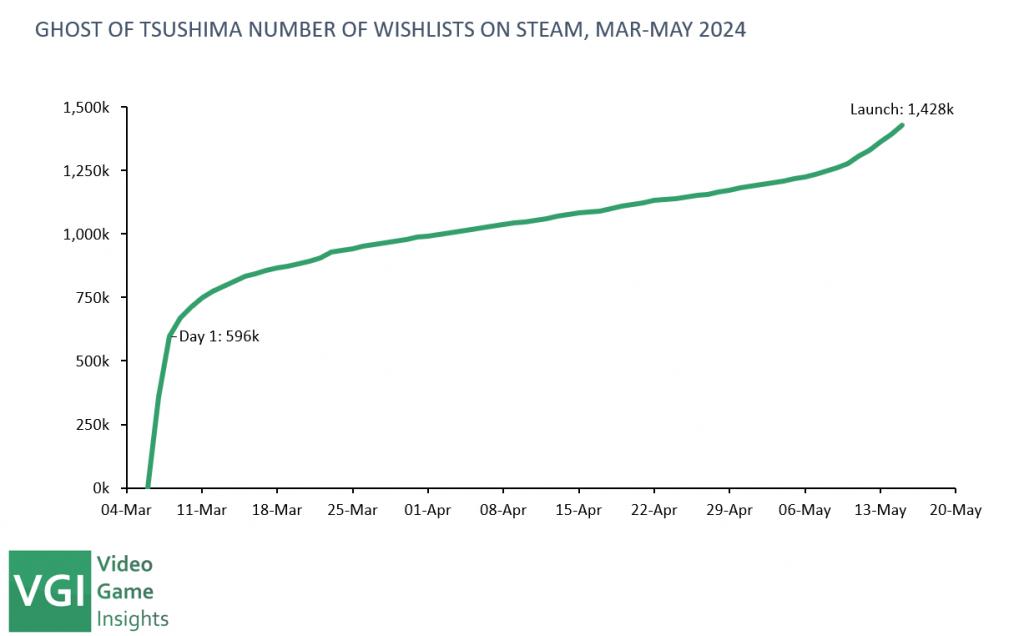
This can be seen quite clearly when looking at the Ghost of Tsushima player overlap
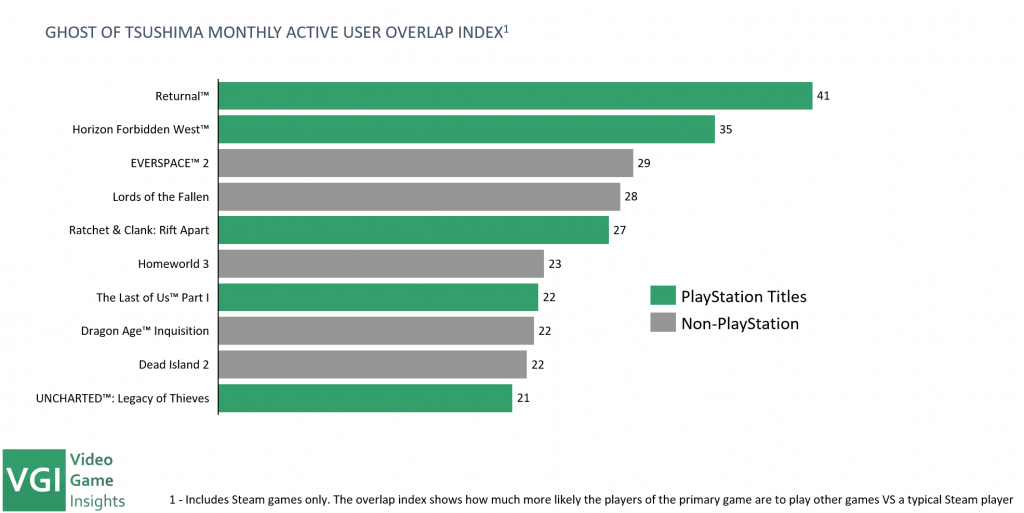
In fact, 5 of the 10 highest overlap indexed games for Ghost of Tsushima are PlayStation titles.
The Player Overlap Index shows how much more likely players of Ghost of Tsushima are to play other games VS your typical Steam player. You can read more about the Player Overlap Index here.
Has the move away from exclusivity and to PC paid off for PlayStation?
That’s a tricky question. It depends. PlayStation PC titles have generated an estimated $830 million over the last 4 years.
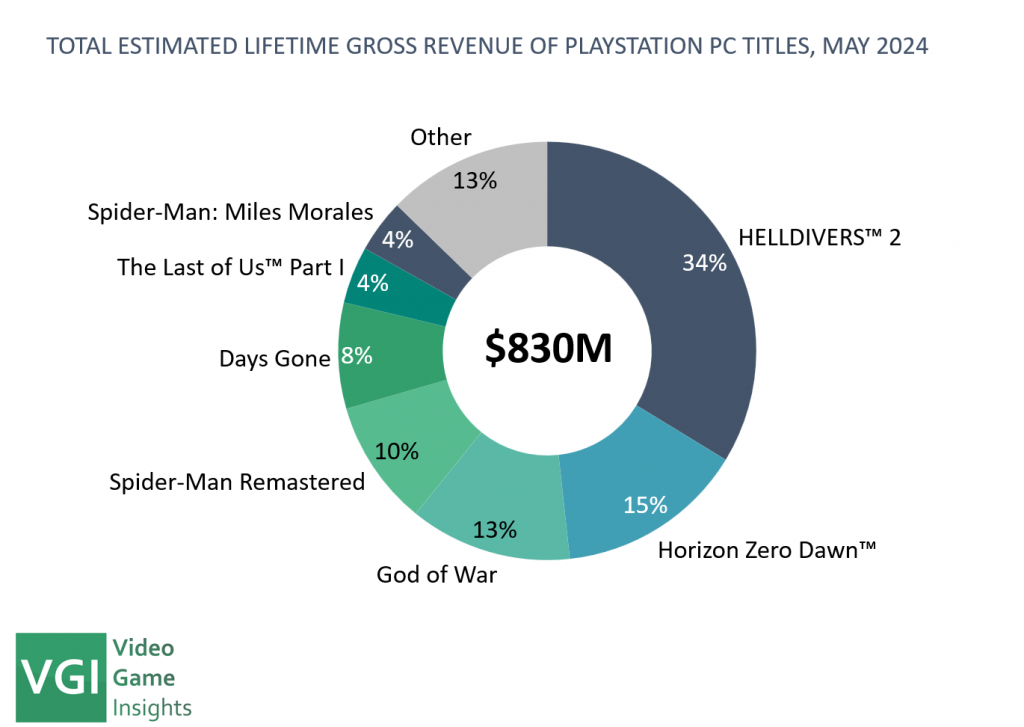
While impressive, this amount pales in comparison to the $29.4 billion generated by Sony’s Game & Network Services segment in FY23 alone. Of course, the G&NS revenue includes first party game sales, physical console sales, PlayStation + subscriptions, and importantly, the 30% cut they take from all sales on PlayStation Store. Still, it’s fair to say that the PC revenues on their own will never be a major segment for Sony’s gaming division.
For a fairer comparison, let’s examine PC sales relative to PlayStation platform sales using Horizon Zero Dawn as an example. Horizon Zero Dawn has sold about 24M units across PlayStation and PC by May 2023. 3.7M of that or c. 15% of total units sold were on PC. However, the PC pricing has been higher (even after Steam cut), given Horizon has been priced at $19.99 on PlayStation for the last 6 years.
We estimate that Horizon Zero Dawn has made approximately $120M on PC to date and around $500M on PlayStation. Therefore, releasing Horizon on PC has resulted in a roughly 25% revenue increase, a substantial boost for minimal effort.
With an estimated development budget of $47M (incredibly low for a AAA game of this quality) it means that the PC port alone has paid for the development of the entire game many times over.
Will PC players convert to PlayStation?
If Reddit is to be believed (and it almost never is), no PC player would ever betray their so-called “master race” and they would never do such an embarrassing thing as to move to PS5. And the truth is, there is a group of hard-core PC players who never will. But this group is getting proportionally smaller. Steam is not a niche platform anymore. There are now over 35 million people active on Steam at any given time, nearly double the pre-COVID numbers.
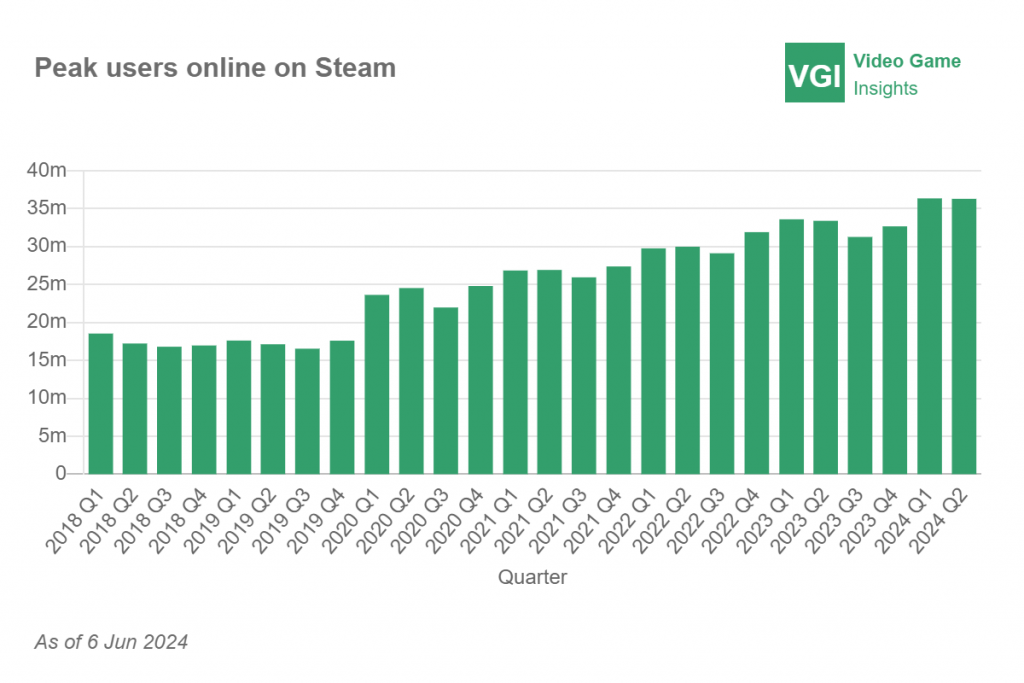
The majority of these players are not hard-core gamers and die-hard PC fans anymore. The casual and mid-core player mix is growing and that’s exactly the audience that Sony can attract. As the PC player base grows and diversifies, the “PC players don’t care for story-based single-player games” will hold less true. Having these games on PC can arguably also serve an “educational” purpose. How can you learn to love these experiences if you never get to try them?
Breaking down the walls of exclusivity
Other publishers have noticed PlayStation’s success and are announcing similar plans to adopt “multi-platform strategies.” Most recently, Square Enix revealed that they are “aggressively pursuing a multiplatform strategy.” While Xbox games have been available on PC for some time, they are now experimenting with bringing some titles to PlayStation.
In a period of slower industry growth, companies are breaking down barriers in search of new opportunities beyond their existing ecosystems. Gamers benefit from a broader access to high-quality titles, while publishers enjoy increased revenue streams and a larger, more engaged audience.
